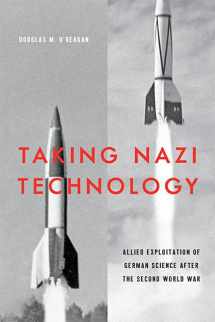
Taking Nazi Technology: Allied Exploitation of German Science after the Second World War
Book details
Summary
Description
Intriguing, real-life espionage stories bring to life a comparative history of the Allies' efforts to seize, control, and exploit German science and technology after World War II.
During the Second World War, German science and technology posed a terrifying threat to the Allied nations. Combined with Germany's generations-old reputation for excellence in science and engineering, these advanced weapons, which included rockets, V-2 missiles, tanks, submarines, and jet airplanes, gave troubling credence to Nazi propaganda about forthcoming "wonder-weapons" that would turn the war decisively in the Axis' favor. After the war ended, the Allied powers raced to seize "intellectual reparations" from almost every field of industrial technology and academic science in occupied Germany. It was likely the largest-scale technology transfer in history.
In Taking Nazi Technology, Douglas M. O'Reagan describes how the Western Allies gathered teams of experts to scour defeated Germany, seeking industrial secrets and the technical personnel who could explain them. Swarms of investigators recruited from industry, military branches, and intelligence agencies invaded Germany's factories and research institutions. They seized or copied all kinds of documents, from patent applications to factory production data to science journals. They questioned, hired, and sometimes even kidnapped hundreds of scientists, engineers, and other technical personnel. They studied technologies from aeronautics to audiotapes, toy making to machine tools, chemicals to carpentry equipment. They took over academic libraries, jealously competed over chemists, and schemed to deny the fruits of German invention to any other land―including that of their allies.
Drawing on declassified records, O'Reagan looks at which techniques worked for these very different nations, as well as which failed―and why. Most importantly, he shows why securing this technology, how the Allies did and when they did, still matters today. He also argues that these programs did far more than spread German industrial science: they forced businessmen and policymakers around the world to rethink how science and technology fit into diplomacy, business, and society itself. A deeply researched comparative history of the American, British, French, and Soviet efforts to control and exploit German science and technology amid fierce internal and external competition, Taking Nazi Technology is the first history to capture the whole picture of this crucial period at the dawn of the Cold War.


We would LOVE it if you could help us and other readers by reviewing the book
Book review



